Cooking for the first time can be intimidating. There are so many rules, tips, and techniques that experienced cooks take for granted. One common mistake that beginners make is washing vegetables with soap, believing that it will make the food cleaner. However, this is not only unnecessary but can also be harmful.
Why Would Someone Wash Vegetables with Soap?

If you’ve never cooked before, you might assume that soap is the best way to remove dirt and bacteria from vegetables. After all, soap is used to clean dishes, hands, and surfaces—so why not food? While this logic seems reasonable, it’s actually a big misconception.
Many beginners want to ensure that their produce is as clean as possible, especially with concerns about pesticides, bacteria, and dirt. However, using soap is an unnecessary step that can do more harm than good.
The Hidden Dangers of Washing Vegetables with Soap
Washing vegetables with soap might sound harmless, but it can lead to several problems:
1. Soap is Not Meant for Consumption
Household dish soap and hand soap contain chemicals and detergents that are not meant to be ingested. Even if you rinse thoroughly, soap residues can remain on the vegetables, leading to stomach discomfort or digestive issues when consumed.
2. It Can Alter the Taste of Your Food
Have you ever accidentally gotten soap in your mouth? That bitter, unpleasant taste can transfer to your food if you wash your vegetables with soap. This can completely ruin the flavor of your dishes.
3. Soap Can Strip Away Natural Protective Layers
Many vegetables and fruits have a natural protective coating that helps keep moisture in and bacteria out. Washing them with soap can strip away these natural defenses, causing them to spoil faster.
4. Risk of Chemical Ingestion
Some soaps contain harmful chemicals that can be dangerous if ingested, even in small amounts. This is why food-grade cleaning solutions exist for commercial use, but for home cooking, they are unnecessary.
What is the Proper Way to Wash Vegetables?
Now that we know why using soap is a bad idea, let’s talk about the correct way to clean your vegetables:
1. Rinse with Cold Water
The best and easiest way to clean produce is by rinsing it under running cold water. This helps remove dirt, bacteria, and pesticide residues without the need for soap or chemicals.
2. Use a Vegetable Brush for Tough Skins

For produce with thicker skins like potatoes, carrots, and cucumbers, using a vegetable brush can help scrub away dirt more effectively.
3. Soak in Vinegar or Baking Soda Water (Optional)
If you’re extra cautious, soaking vegetables in a solution of vinegar and water (1 part vinegar to 3 parts water) for a few minutes can help remove more bacteria and pesticide residue. Baking soda water is another great alternative.
4. Peel When Necessary
If you’re concerned about contaminants, peeling vegetables like carrots, cucumbers, or apples can help remove pesticide residues and dirt.
5. Dry Properly
After washing, pat your vegetables dry with a clean towel or let them air dry. This helps prevent bacterial growth and keeps them fresh longer.
Common Misconceptions About Cleaning Vegetables

There are plenty of myths about washing vegetables, and it’s important to separate fact from fiction:
- “Hot water kills bacteria faster.” – While hot water can kill bacteria, it can also cause vegetables to wilt or lose nutrients. Stick with cold water.
- “Soap removes pesticides better than water.” – Water alone does a great job of removing most pesticide residues, especially if you scrub or soak the produce.
- “You need special fruit and vegetable washes.” – While commercial produce washes exist, studies show they’re not significantly more effective than plain water.
Final Thoughts
Washing vegetables is an essential step in cooking, but using soap is a rookie mistake that should be avoided. Soap isn’t designed for consumption, and it can leave harmful residues on your food. Instead, stick to cold water, gentle scrubbing, and natural cleaning solutions like vinegar or baking soda.
Cooking is a learning process, and mistakes happen. But now that you know why soap and veggies don’t mix, you’re one step closer to becoming a kitchen pro. Happy cooking!
I Opened My Mother-in-Law’s Christmas Gift & My Husband Kicked Her Out Because of It
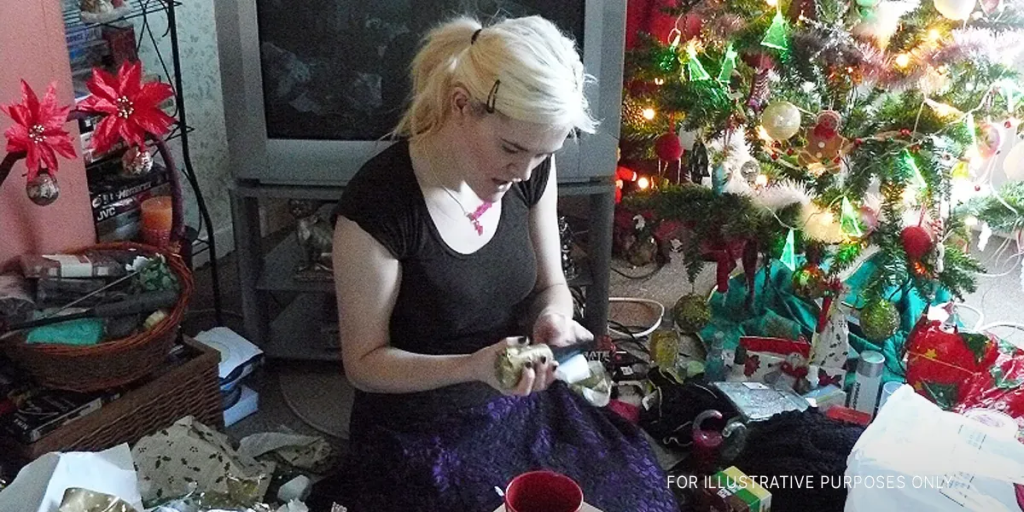
Hosting Christmas for my in-laws was supposed to be a joyous affair, but the evening took a shocking turn when my mother-in-law gifted me something that left the entire room speechless. What started as festive cheer quickly spiraled into an unforgettable family showdown.
Christmas is supposed to be magical, right? A season of love, family, and giving. Well, this year, it turned into a drama-filled spectacle, starring none other than my mother-in-law, Judith. But before I get to the moment she completely blindsided me, let me give you some context about our… complicated relationship.
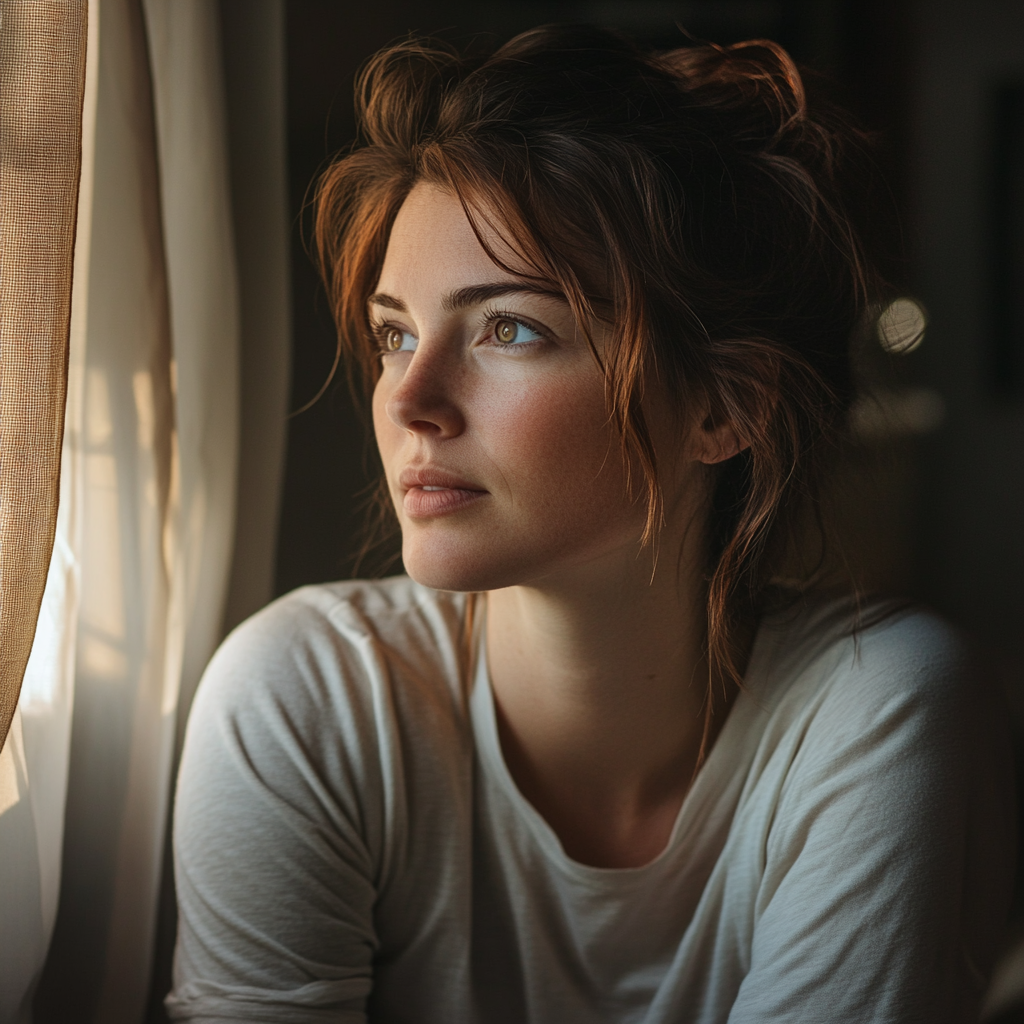
A thoughtful woman looking out the window | Source: Midjourney
I met my husband, Trent, three years ago, and we hit it off instantly. By then, he’d already been divorced from Rose, his ex-wife, for two years. Rose and I couldn’t be more different — she’s the elegant, always-poised type, and I’m more of the “let’s wear fuzzy socks to dinner” kind of girl. Trent said he loved that about me. I thought Judith, his mom, did too. At least, at first.
When I met Judith, she was warm and polite. I even thought we could be close someday.

A polite and warm-looking senior woman | Source: Midjourney
But as time passed, cracks began to show. Subtle, at first, things like “accidentally” calling me Rose.
“Oh, I’m sorry, Elle, I meant you! It’s just… you remind me so much of her,” she’d say with an apologetic smile that never quite reached her eyes.
“It’s okay,” I’d reply awkwardly, not sure how to take it.
Then the comments escalated.
“She always kept her house spotless,” Judith mentioned once during a visit, her gaze sweeping over my lived-in living room. “Rose used to say, ‘A tidy house is a tidy mind.’ You might want to try it—helps with stress.”

A woman smiles slyly while looking at someone | Source: Midjourney
I bit my tongue, smiling stiffly. What could I even say? Judith’s tone was sweet, but the words stung. I told myself she just needed time to adjust. After all, I wasn’t the first daughter-in-law she’d had.
But her digs weren’t always so subtle. At one family dinner, she casually brought up a photo album of Trent and Rose’s wedding.
“I found this the other day,” she said, sliding it across the table. “Wasn’t she stunning? It’s no wonder the whole town thought they were the perfect couple.”
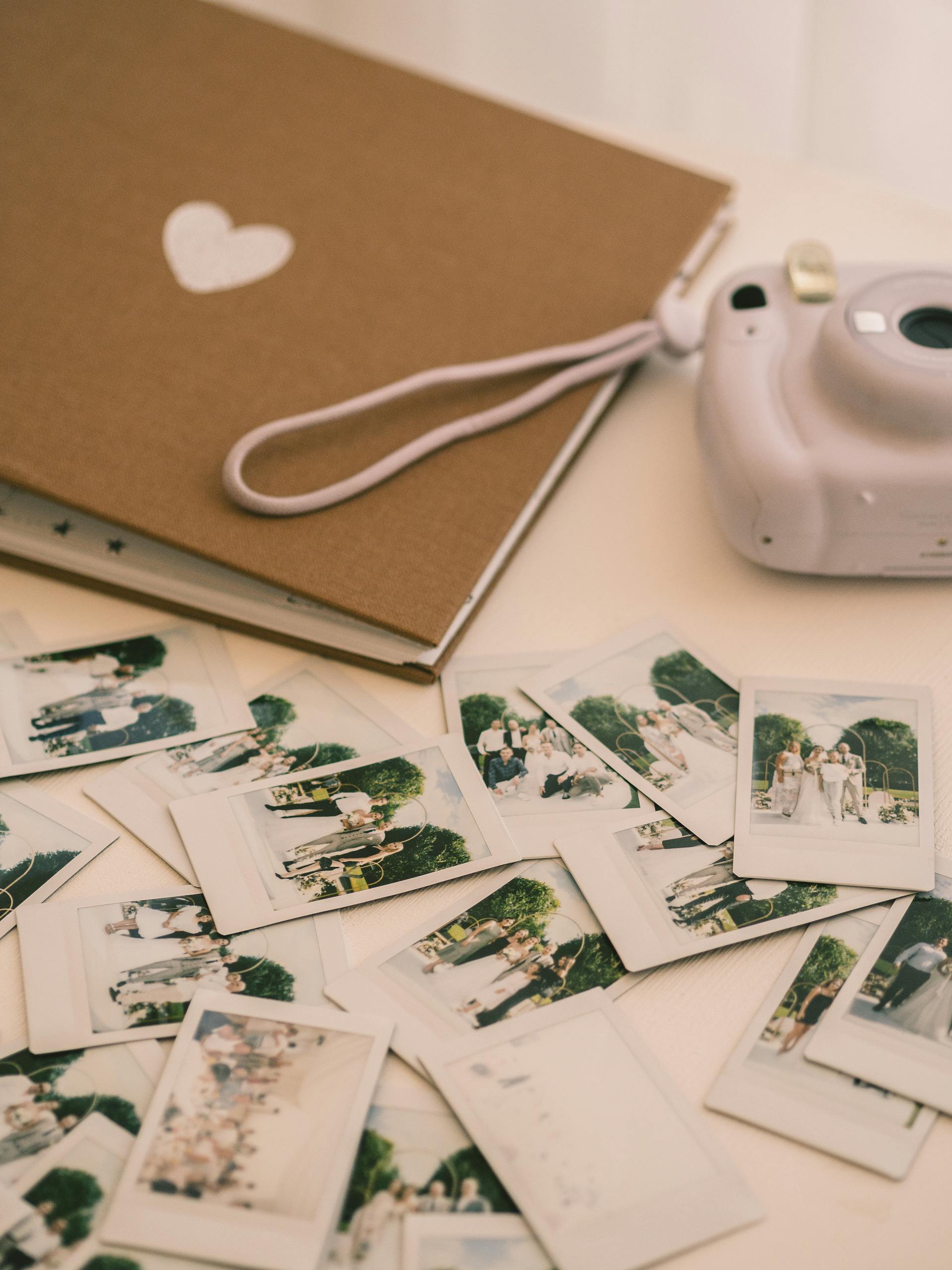
A photo album, wedding photos, and a camera lying on a white surface | Source: Pexels
“Mom,” Trent said sharply, his jaw tightening. “Why are you showing us this?”
Judith blinked innocently. “Oh, I just thought Elle would enjoy seeing it. She could get some inspiration for family photos.”
I didn’t even get the chance to respond. Trent grabbed the album and shut it. I thought that would be the end of it, but it wasn’t. Judith’s comparisons kept coming, like a slow drip meant to wear me down.
One night, after a particularly exhausting day, I brought it up to Trent.
“Does she… hate me?” I blurted, not meeting his eyes.
He frowned. “Who?”
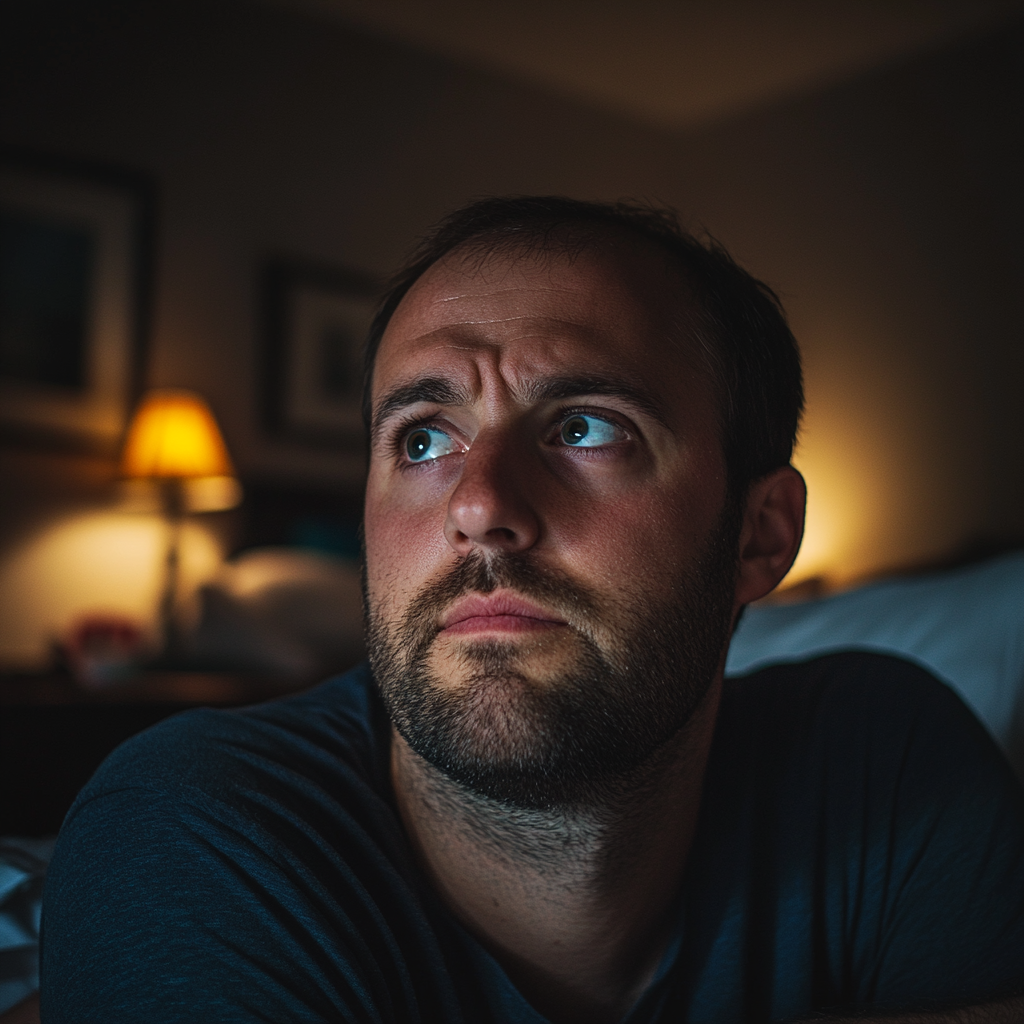
A man slightly frowning while looking at someone | Source: Midjourney
“Your mom. I mean, she’s so sweet in front of everyone, but behind closed doors…” I hesitated, trying to find the right words. “She’s different. She talks about Rose constantly—like I’m some second-place replacement.”
Trent sighed. “Elle, she hated Rose. Trust me, she’s told me that for years.”
I shook my head. “Then why does she keep comparing us? Why bring her up at all?”
“I don’t know,” he said softly, rubbing his temple. “But I’ll talk to her.”
He tried, but Judith brushed it off. “I’m just teasing,” she’d told him with a laugh. “Elle’s so sensitive. She’ll toughen up.”

A senior woman laughs slyly while looking at someone | Source: Midjourney
Fast-forward to Christmas Eve. I’d gone all out, decorating the house, cooking, and hosting the entire family. I wanted everything to be perfect. For a while, it was. There were carols, laughter, and the warmth of togetherness.
And then came the gifts.
Judith handed me hers with a wide smile. “This is for you, Elle,” she said. “I think you’ll find it… meaningful.”
“Thank you,” I replied, smiling cautiously as I unwrapped the box.
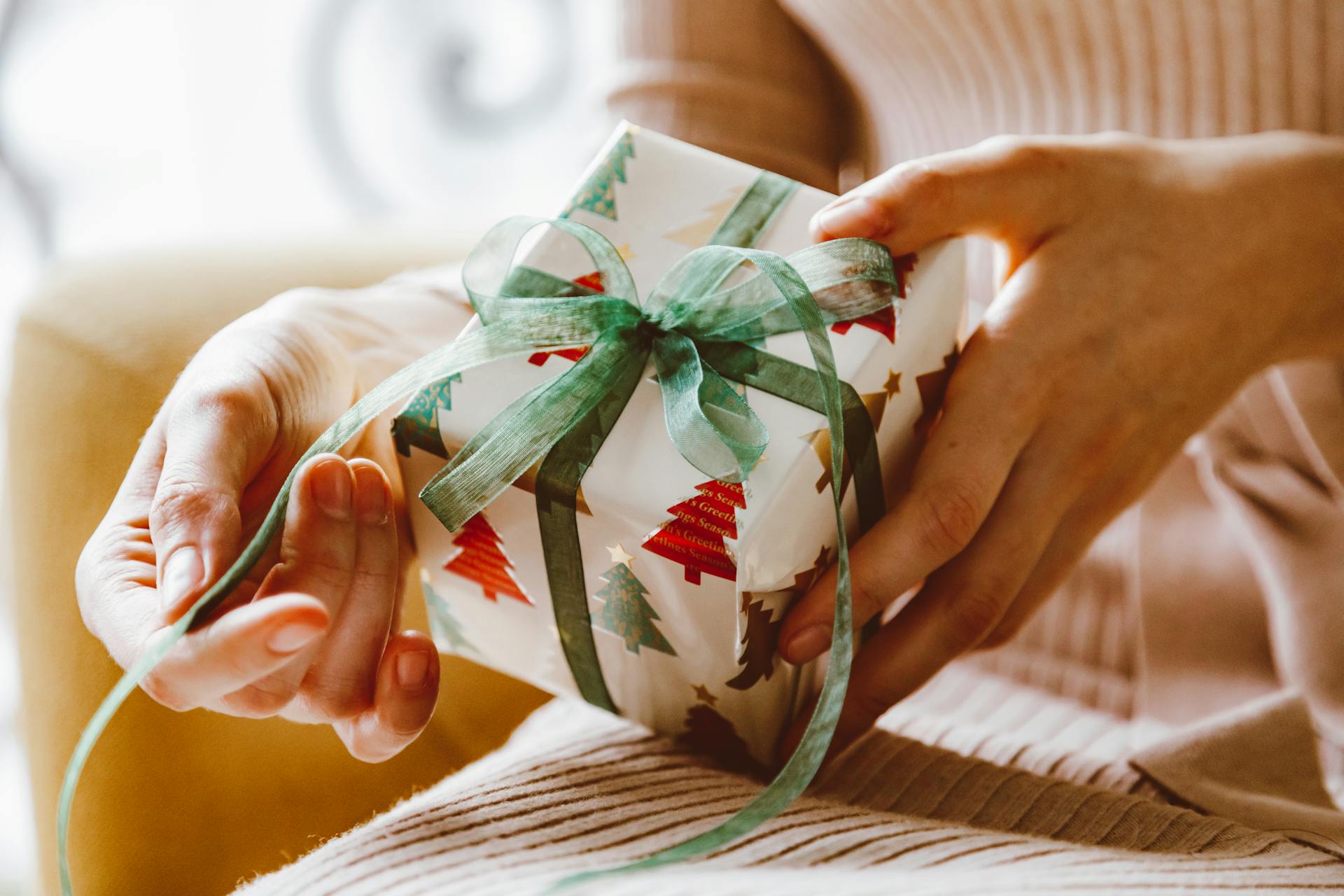
A closeup shot of a woman’s hands about to unwrap a Christmas present | Source: Pexels
The room fell silent as I pulled out the gift, a pair of stunning earrings. Gasps echoed around as my non-existent moment of joy turned into absolute shock. My cheeks burned as I stared at it, unable to process what I was holding.
Judith’s grin widened like she had just pulled off the prank of the century. My mouth went dry as I realized the earrings were Rose’s. I’d seen them in that photo before — Rose beaming beside Trent and Judith, all of them looking so picture-perfect. This wasn’t just a careless mistake. It was deliberate.

A woman in a white dress wearing matching earrings | Source: Pexels
Judith clasped her hands together. “Do you like them, Elle? They’re very… sentimental.”
I stared at her, my words caught somewhere between fury and disbelief. “These—these were Rose’s, weren’t they?”
Her face didn’t flinch. “Oh, were they? I hadn’t noticed. I thought they’d suit you better. She didn’t really appreciate them, you know.” She turned to the rest of the family with a sugary smile, like this was all perfectly normal.

A senior woman with a sugary smile | Source: Midjourney
The gasps from the room morphed into uncomfortable murmurs. Trent’s jaw tightened, and he shot me a look of silent outrage. His voice cut through the noise like steel. “Mom, what is wrong with you?”
Judith’s grin faltered slightly. “Oh, come on. It’s just a pair of earrings! I thought Elle would appreciate something elegant for once.”
I stood up, my legs feeling wobbly. “Elegant?” My voice came out sharper than I intended. “This isn’t a thoughtful gift. It’s… it’s cruel. You’ve spent years comparing me to Rose, and now this?”
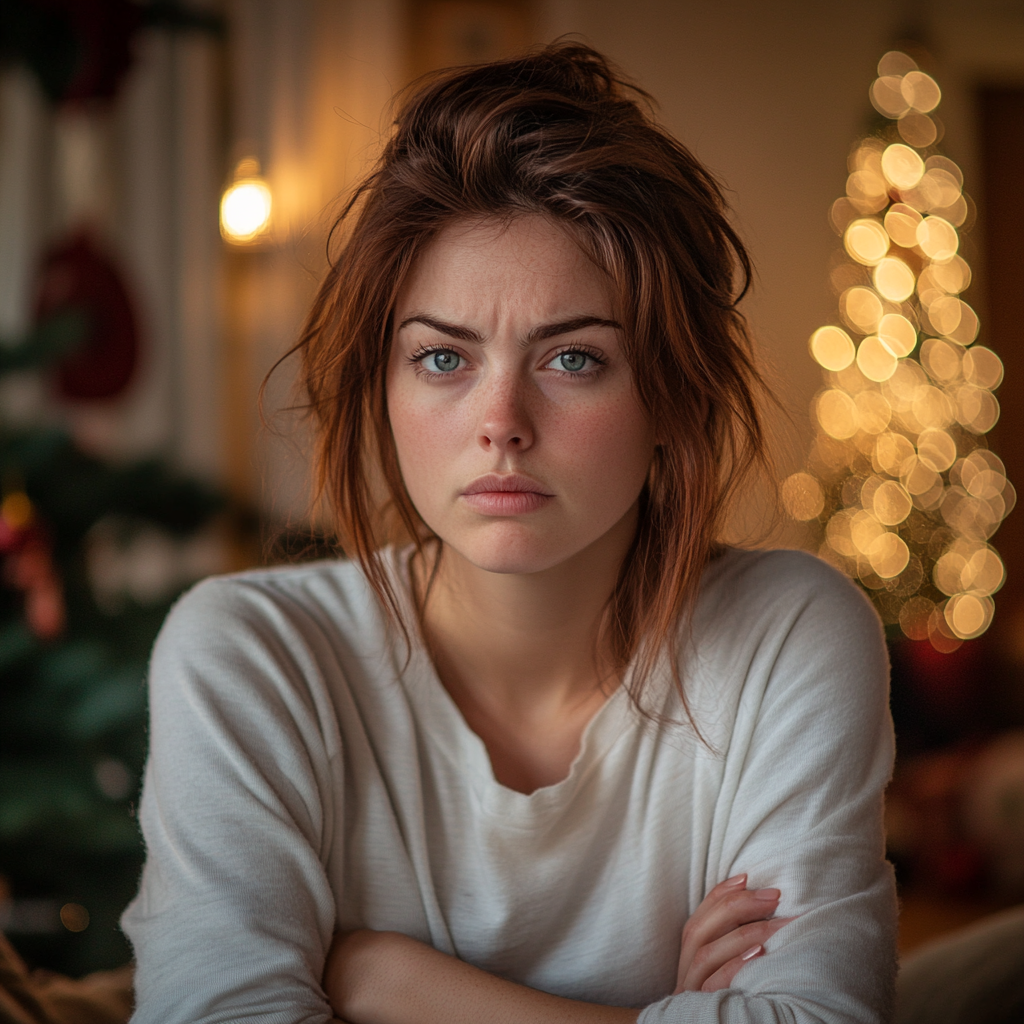
An upset woman | Source: Midjourney
Judith leaned back in her chair with an air of mock innocence. “Cruel? Elle, don’t be so dramatic. It’s Christmas. Let’s not ruin the mood.”
“No, you ruined the mood,” Trent snapped, his voice rising. “Mom, you’ve crossed the line too many times, and I’m done pretending this is okay.”
Judith’s face darkened. “Excuse me? I’m your mother.”
“And I’m his wife,” I interrupted, my voice steady now. “And you’ve disrespected me for the last time.”
Trent didn’t hesitate. “Mom, I think you should leave.”
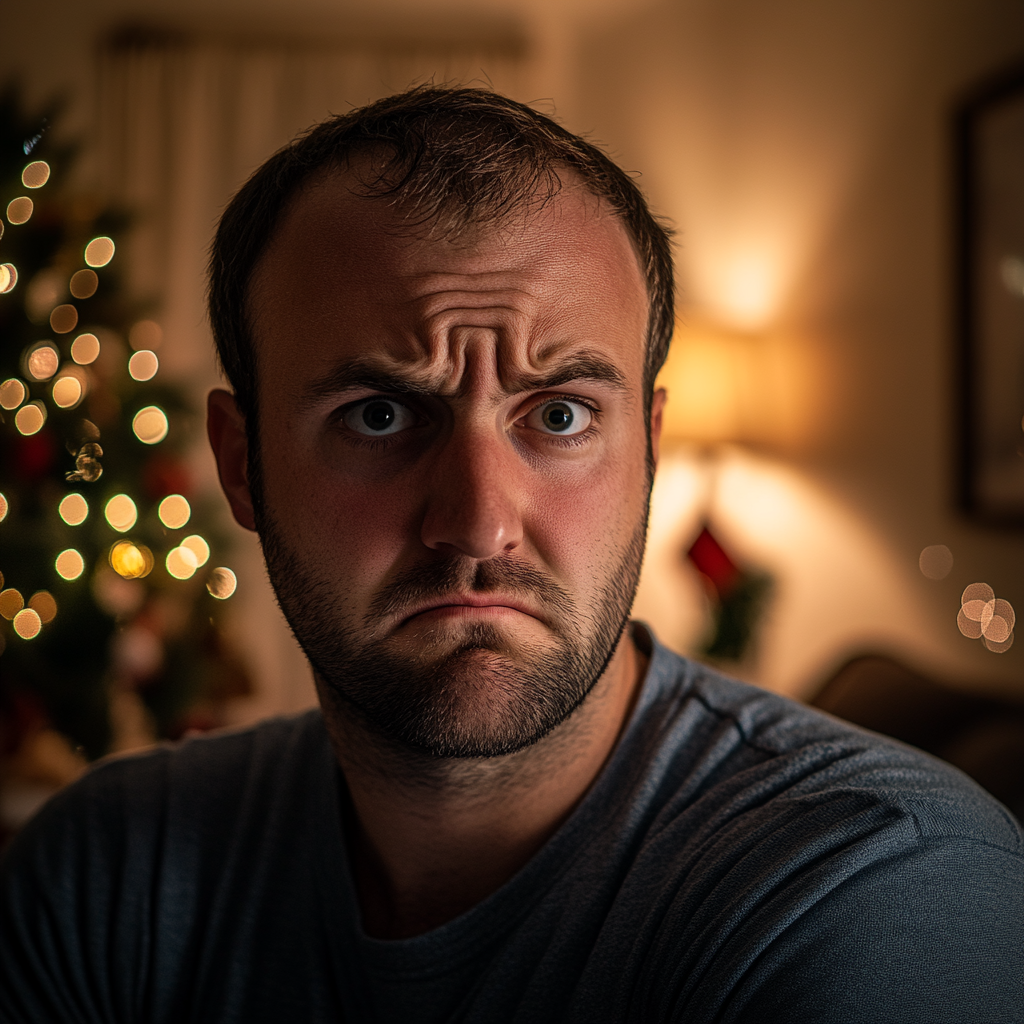
An angry man | Source: Midjourney
The room collectively held its breath. Judith’s face turned a deep shade of red, and for a moment, she looked genuinely stunned. Then, she laughed bitterly, shaking her head. “Leave? You’re kicking me out? On Christmas?”
“Yes,” Trent said firmly. “Because your behavior is unacceptable.”
Her voice rose in a panicked crescendo. “Unacceptable? After everything I’ve done for you? For this family?”
I stepped forward, still clutching the earrings. “Wait.” Everyone turned to me. “I’ll be right back.”

A woman with a determined look | Source: Midjourney
I rushed upstairs, my heart pounding in my chest. I rifled through an old drawer until I found the photo: Judith, Trent, and Rose, all smiles. The very picture that had haunted me for months. Wrapping it hastily in leftover paper, I returned to the living room.
“Here,” I said, handing the awkwardly wrapped gift to Judith. “Merry Christmas.”
She frowned but tore off the paper. When the picture emerged, her face twisted with confusion before morphing into something more vulnerable — embarrassment, maybe even shame.
“What is this supposed to mean?” she asked, her voice trembling.
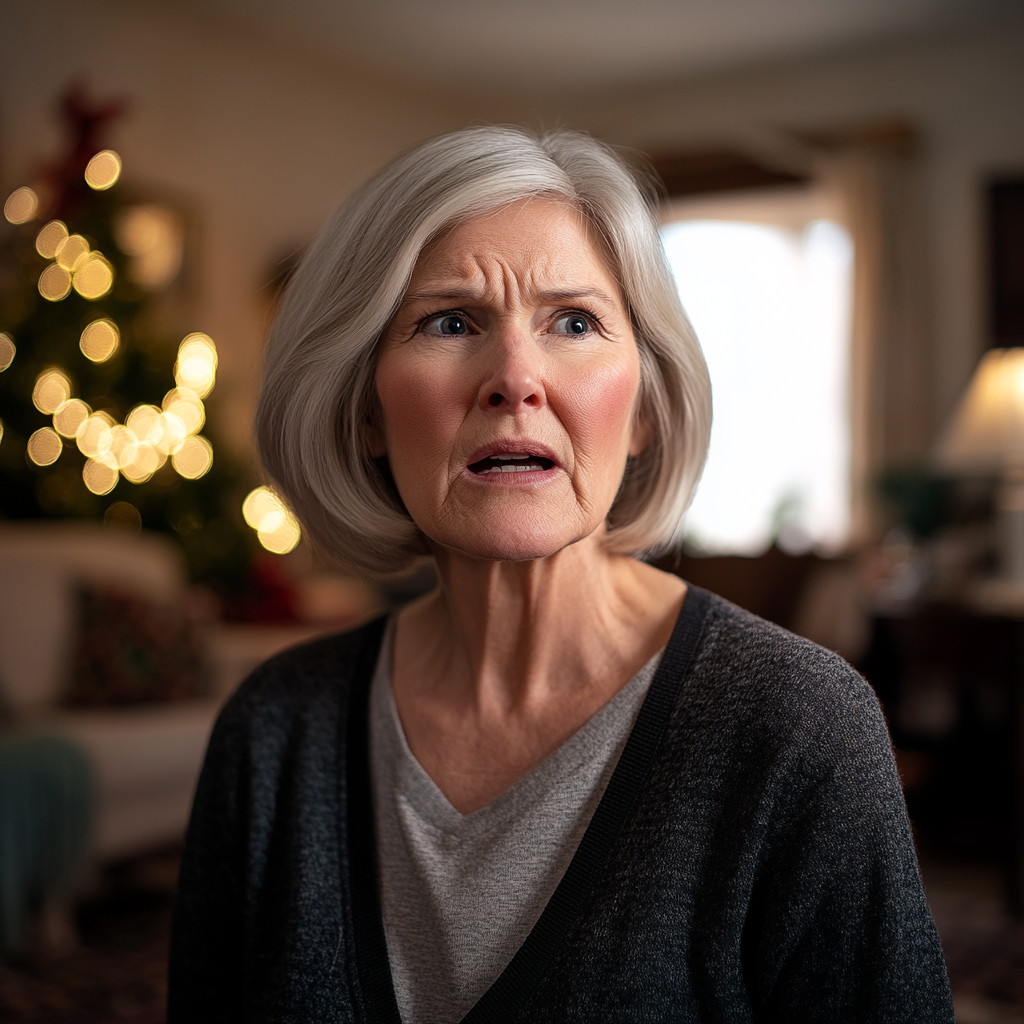
A surprised and upset senior woman | Source: Midjourney
“It’s a picture of you, Trent, and Rose,” I explained, keeping my tone calm despite the storm inside me. “You’ve spent years reminding me I’m not her. I thought you’d appreciate a keepsake of the person you clearly wish was still here.”
The silence was suffocating. Judith stared at the picture, her hands shaking. For the first time, she looked small, cornered.
Trent stepped closer, his voice low but firm. “Mom, you need to leave. Now.”

A man looks angry and serious | Source: Midjourney
Judith’s tantrum came swiftly. She slammed the picture onto the table. “You’re both so ungrateful! I’ve only ever tried to help you. And this is how you repay me? Kicking me out of my own son’s house?”
“Mother,” Trent said, his patience hanging by a thread, “this is my house, and you’ve overstayed your welcome. Please leave.”
She grabbed her coat in a huff, muttering under her breath as she stormed out. “I hope you both enjoy your little perfect life. Don’t come crying to me when it all falls apart.”
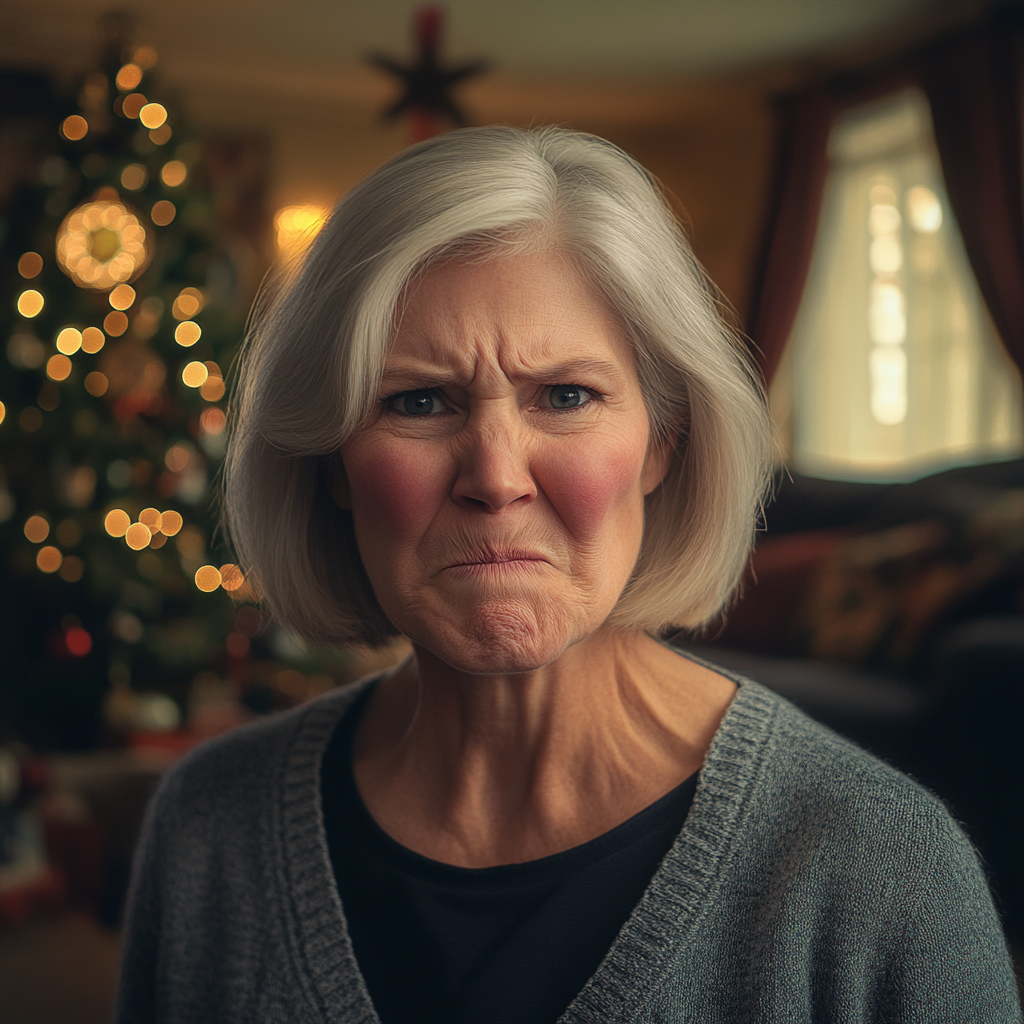
A very angry and upset senior woman | Source: Midjourney
The door slammed behind her, and the room was eerily quiet.
Later that night, Trent and I sat by the fireplace, the glow of the flames casting shadows across the room. I was still clutching the earrings, unable to decide what to do with them.
“I’m sorry, Elle,” Trent said softly. “I should’ve stood up to her sooner.”
I shook my head. “It’s not your fault. She just… she couldn’t let go of the past. And maybe she didn’t know how to move forward.”

A woman looking at someone | Source: Midjourney
He took my hand. “Yeah, maybe. Anyway, let’s just forget about everything and not ruin our mood. Are you in the mood for some holiday cheer?”
“Of course,” I whispered.
Over the next year, something surprising happened. Judith reached out — not with snide remarks or manipulative apologies, but with genuine remorse. It started with a simple message.
“Elle,” it read, “I realize I’ve hurt you deeply, and I’m ashamed. I don’t expect forgiveness, but I want to try to earn your trust.”
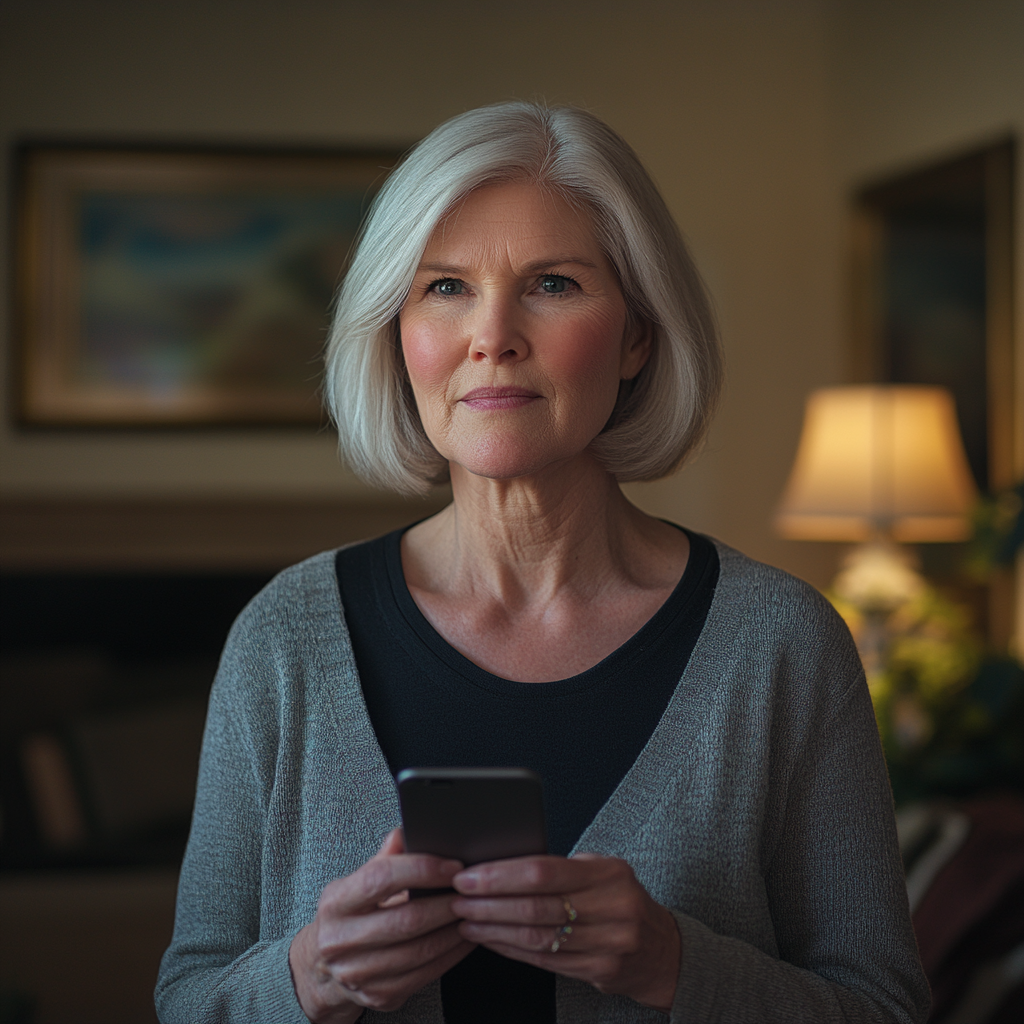
An apologetic senior woman holding her phone | Source: Midjourney
It wasn’t easy at first. Trust is a fragile thing, especially when it’s been shattered. But Judith kept showing up: calling to check in, inviting me to lunch, even asking for my advice on little things. Slowly, my walls came down.
By the time Christmas rolled around again, I felt a tentative warmth toward her. When she handed me a small box during our holiday gathering, I braced myself. But inside was a knitted muffler, hat, and gloves — all in my favorite colors.

A gift box containing a knitted muffler, cap, and gloves | Source: Midjourney
“I made these for you,” she said quietly. “I wanted to give you something from the heart this year.”
Tears stung my eyes as I pulled out the soft wool. “Thank you,” I whispered. “They’re perfect.”
This time, the warmth of Christmas wasn’t marred by tension or rivalry. It was just… peaceful. Judith and I weren’t perfect, but we were trying. And that, I realized, was the best gift of all.
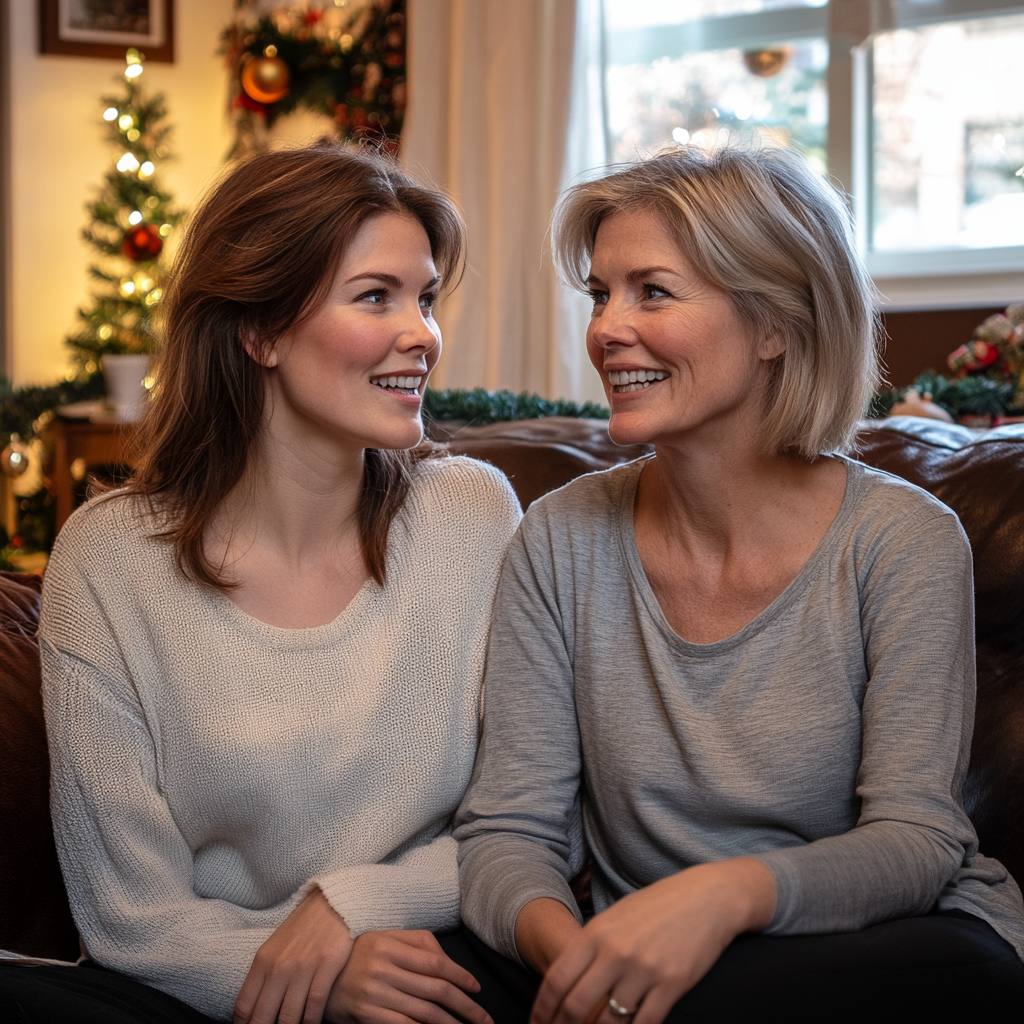
A woman bonding with her mother-in-law during Christmastime | Source: Midjourney

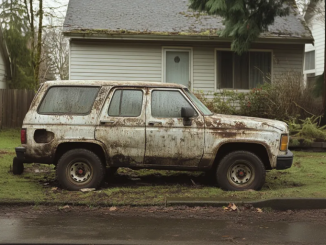

Leave a Reply